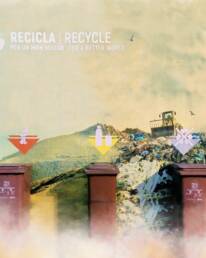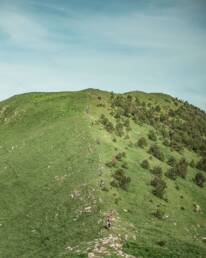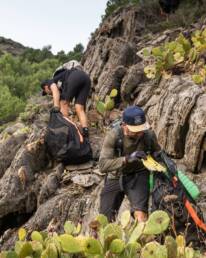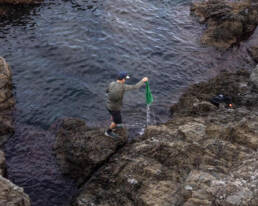01
0 residue
We install a green dot at all events to report and manage all actions that promote 0 waste. We've done away with single-use organic packaging and replaced it with rice husk cups and bowls that have a 200-use life cycle. Participants collect them and return them to the green point to be reused. Water bottles have also been replaced by fountains and drums, while beverage cans are crushed and stored for transport to an aluminum smelting plant.
There is no waste. In the green point, only an organic container has been installed to throw food scraps that will be composted once the event is over. The cartons and other materials from the different suppliers are returned to their source so that they can be put to another use. We have removed the runner's bag with brochures and promotional gifts from sponsors. We replace it with digital marketing. We are the first 0 residue outdoor sports events.


02
Responsible consumption
We rely on local and local suppliers to offer the highest quality in our products and services and, at the same time, the most sustainable. In the refreshments we offer healthy food avoiding saturated and processed products.
03
carbon footprint
We calculate the environmental impact of our activity. The total amount of greenhouse gases (GHGs) we emit determines our carbon footprint. This is certified annually following international regulations regulated to compensate it through different environmental actions. Based on these results, we detect which points we can improve to reduce the volume of our emissions.
04
Environmental tax
At each of our events we make a donation, equivalent to one euro per participant, to a local environmental organization or group. The environmental fee that we apply to the price of all registrations has a direct impact on actions to preserve and improve the area where we carry out our activity. These actions are independent of those we carry out as a collective.


05
green footprint
We leave no trace. We go over and clean the environment before and after each of our events. Our routes are marked with cloth tape, signs and reusable straps. We do not produce single-use plastic or paper signage. The next day the mountain must be lifted as we found it.
We minimize the impact on the departure and arrival area by disguising the event to a minimum and opting for organic elements. We work to seek purity over artificiality. As organizers we are responsible for not encouraging large participation or promoting large crowds during the route. We prioritize the participant's connection with nature in a fragile, sensitive way, with silence and respecting its habitat as if we were not there. We must emphasize the natural environment above all else.
06
Historical memory
We promote forgotten natural assets by offering alternative itineraries away from the most visited and easily accessible points. We are committed to recovering old paths and giving visibility to the purest and most remote places with the utmost respect for the environment. This is the formula to accentuate the history of our mountains.

activism
Beyond the environmental measures of our events, we also carry out different actions as a collective. We are a group of athletes committed to the environment and in the fight against climate change and its consequences. Throughout the year we organize and promote waste collections both in remote places with difficult access and in places with a lot of users.
All our actions emphasize the clearing of undergrowth so that the trees have optimal growth to absorb CO2. Another priority is the preservation of the environment to end deforestation and speculation, as well as the recovery and protection of native species in danger of extinction.
WE OFFSET OUR CO2 AND THAT OF OUR ATHLETES. CARBON NEUTRAL!
Every event encourages the movement and displacement of people. Our priority is not to create large massed events; we have always focused on our standards QUALITY OVER QUANTITY and NO NATURE NO FUTURE with the aim of conserving and preserving the environment. However, we are aware of the current context where the European Union is the third largest emitter of greenhouse gases; behind only China and the United States.
It is necessary to exercise responsibility. We must act and keep fighting to do everything in our power. We want to share with you our latest action, a wind energy project in a region of India. We have purchased a credit of 400 tonnes of Co2 to reduce greenhouse gas emissions generated directly and indirectly by our activity and offset all emissions generated by the travel of our athletes and the organization during all events in 2023.
We started this path seven years ago, when we started to create awareness in our community under the motto “NO NATURE NO FUTURE”. Every year we carry out a series of activities to connect athletes and people with nature in the most respectful and responsible way. The results were very positive and we decided to take pioneering and necessary measures such as reducing, recycling, reusing and replacing materials in order to leave no footprint. Last year we promoted the idea of RESET. There was no going back, we broke everything and reset the organizational model to be the first 0 residual events.
This transition is expensive and not within everyone’s reach. People’s perception when you downsize is that you’re saving, when in reality it’s the opposite. Downsizing is expensive. A polyester t-shirt that is composed of raw material is worth a third of an organic cotton t-shirt. The economic price of using reusable rice husk containers is much higher. The same goes if you want to offset your Co2 emissions voluntarily. Although our emissions have decreased by 50%, we cannot deny the reality. It was time to take action.
We cannot prohibit you from using your car to travel to one of our events. This is not the solution. We have simply acted consistently and responsibly. Our duty as organizers is to do everything in our power to make things easier for a society that usually makes decisions individually, while expenses and more expenses arise from energy lobbies and pressure groups, the housing or food.
Three years ago, we set out to reduce our Co2 footprint. In 2020 we started to calculate and offset the emissions generated by our organizational logistics, but in 2022 we decided to take a step forward by neutralizing all the carbon of the event. From start to finish Both organization and athletes. We are aware that our calendar incorporates national and international events, encouraging land and air mobility that generate emissions. We are currently running a total of 13 events per year with an average of 650 participants.
The main problems caused by the climate emergency are derived from the burning of fossil fuels used for energy. They are responsible for 77.01% of greenhouse gas emissions, while transport accounts for a third. Greenhouse gas emissions from agriculture contribute with 10.55%, industrial processes, the use of industrial products and processes with 9.10% and waste management with 3.32% . Carbon dioxide (Co2) is the greenhouse gas that is most often emitted into the atmosphere as a result of different human activities, but we cannot forget methane, 80 times more powerful than carbon dioxide during a period of 20 years.
Our nature suffers because of the changes in cycles, but especially because of the increase in temperature due to our emissions. The particular vulnerability of the poorest countries to climate risks should be highlighted. Developing countries are much more affected by extreme weather conditions than industrialized countries. Although absolute economic losses are greater in rich countries, the consequences are more devastating in lower-income countries. This is because they are less able to cope with the damaging effects of climate threats. In Europe, the climate emergency has only touched us, but we have put the lives of millions of people in poor countries at risk.
To calculate the volume of our emissions we carry out surveys and count the vehicles and origin of our participants, as well as meticulously study the origin of our products, suppliers and energy consumed. We are aware that we will not stop moving and broadcasting overnight. We also don’t want you to take this compensation as a whole if it’s worth it. It is for this reason that for the next season we will reward all participants who travel by sharing a vehicle or using sustainable mobility.
The 400 tons of CO2 have been offset in a project in Madhya Pradesh, a region in India, that harnesses the potential of available wind power to generate clean energy. The project activity will install and operate 5 sophisticated and state-of-the-art Wind Turbine Generators (WTG) consisting of 4*2000kW and 1*1500kW with an aggregate installed capacity of 9.5MW. The project will generate approximately 18470 MWh of electricity per year. This compensation is equivalent to planting 2400 trees or removing 272 cars.”
- The project will create jobs, improve infrastructure and increase access to electricity, resulting in social well-being in the region.
- The project promotes the use of wind energy helps conserve natural resources, promotes economic sustainability and creates new opportunities for industries and economic activities, which results in greater economic well-being.
- the project has a positive impact on the environment and contributes to environmental well-being by using clean wind energy and avoiding pollution and greenhouse gas emissions.
- The project employs advanced technology for efficient energy production, leading to technological well-being.
Overall, the project contributes significantly to sustainable development.
#RESET
Klassmark’s #NoNatureNoFuture program measures are not an option. The time has come to do a #reset, change of mentality, to value what is really important in an outdoor event. The greatness of these sports is in the natural environment where they are practiced. We need to act immediately if we want to continue enjoying outdoor sports as we understand them until now. Without nature there is no future.

